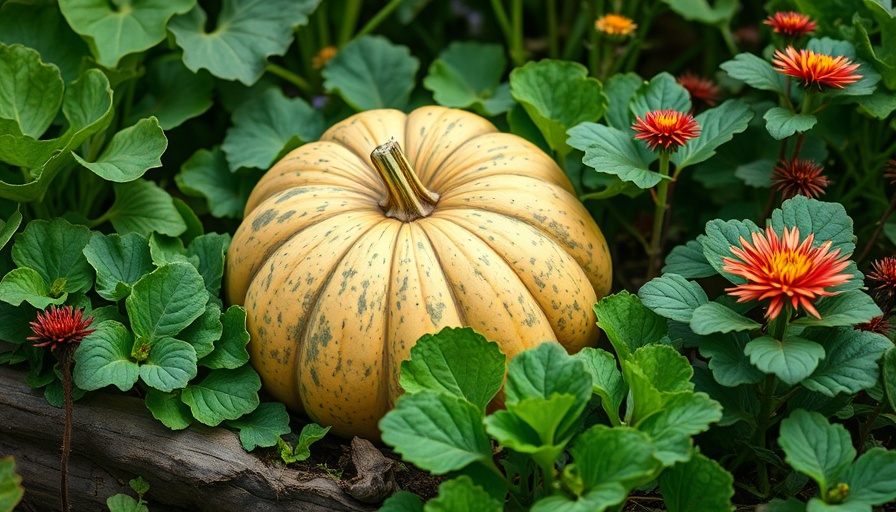
Why Pumpkins Love Company: The Benefits of Companion Planting
Pumpkins, with their vibrant orange hue and charming bulk, have long been associated with fall festivities. But beyond their seasonal aesthetics, these gourds thrive when planted alongside their companions. Each plant selected to share garden space with pumpkins serves a specific purpose, enriching the soil, deterring pests, and providing shade or support. Understanding these relationships can transform your garden into a flourishing ecosystem.
Essential Companion Plants for Your Pumpkin Patch
When planning your pumpkin garden, consider these essential companions:
- Corn: This towering plant offers structural support for pumpkins. Corn's height provides shade, which can help keep the soil damp and reduce the growth of weeds.
- Korean Licorice Mint: Known for its aromatic leaves, this plant can deter pests and improve the overall health of your pumpkin plants.
- Lavender: Not only does lavender add beauty to your garden with its stunning purple flowers, but it also helps repel pests like aphids and squash bugs.
- Marigolds: A gardener's favorite, marigolds are famous for their pest-repelling properties. They emit compounds that deter harmful insects while attracting beneficial ones.
- Marjoram: This herb can enhance the taste of surrounding plants while keeping pests at bay.
- Nasturtiums: With their stunning flowers and edible leaves, nasturtiums attract aphids away from pumpkins, acting as a trap crop.
- Pole Beans: These legumes not only fix nitrogen in the soil but also provide a vertical structure that can enhance airflow among your plants.
- Sunflowers: Tall sunflowers can provide shelter from windy conditions while bringing pollinators to your garden.
Avoiding Bad Company: What Not to Plant with Pumpkins
While companion planting has its benefits, it's equally crucial to know what plants to avoid. Keep cucumbers, potatoes, and fennel away from your pumpkin patch, as these plants can compete for nutrients and increase the risk of disease. For a successful harvest, it's always best to choose companions wisely.
The Importance of a Diverse Garden Ecosystem
Creating a variety of plants in your garden not only utilizes space effectively but also fosters a natural pest control system. Monocropping, or planting just one type of vegetable, can make your pumpkins more susceptible to pests. Mixing your pumpkin patch with companion plants offers built-in defenses. When their colorful blossoms fill the air, they not only brighten the garden but also confuse potential pests, reducing their impact substantially.
Making the Most of Your Garden's Resources
Pumpkins are heavy feeders that thrive on nutrient-rich soil. By incorporating legumes such as beans, you enhance the nitrogen levels in the soil—essential for the growth of your pumpkins. Additionally, companion plants can act as living mulch, shading the soil, maintaining moisture, and suppressing weed growth. This symbiotic relationship maximizes your garden's efficiency.
The Joy of Growing Together
As you embark on your pumpkin-growing adventure, embrace the connections between plants. Not only do companion plants assist your pumpkins in achieving healthier growth, but they also create a beautiful tapestry of colors and scents. Planting with intention allows your garden to reflect your values of sustainability and health.
Steps to Craft Your Perfect Pumpkin Companion Garden
1. Choose your planting layout thoughtfully, incorporating both vertical and horizontal growth patterns. 2. Ensuring adequate spacing between plants will allow for air circulation to reduce the risk of fungal diseases. 3. Consider the sun exposure each type of plant requires, ensuring that pumpkins receive enough light without overwhelming their smaller companions.
With a little planning and attention to detail, your garden can flourish. You can become a part of the cycle of growth and self-sufficiency, connecting deeply with the earth and the food you consume. Your garden is not just a patch of vegetables; it’s a dynamic ecosystem full of life and possibilities that even you can cultivate!
 Add Row
Add Row  Add
Add 




Write A Comment